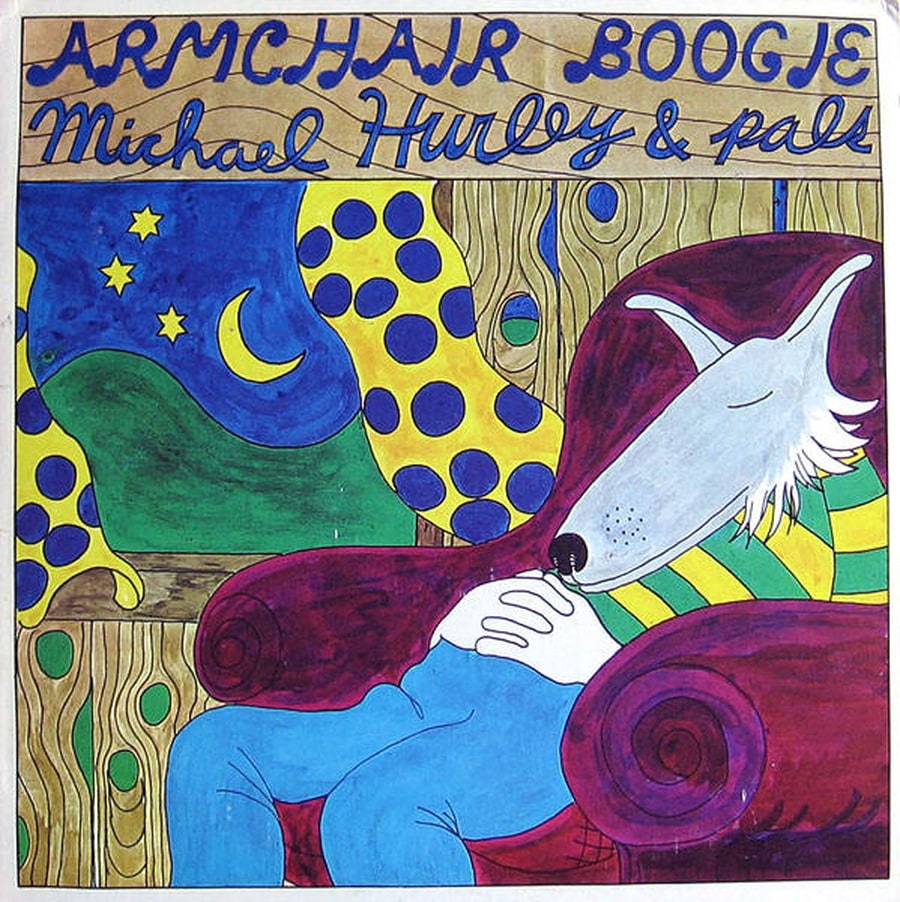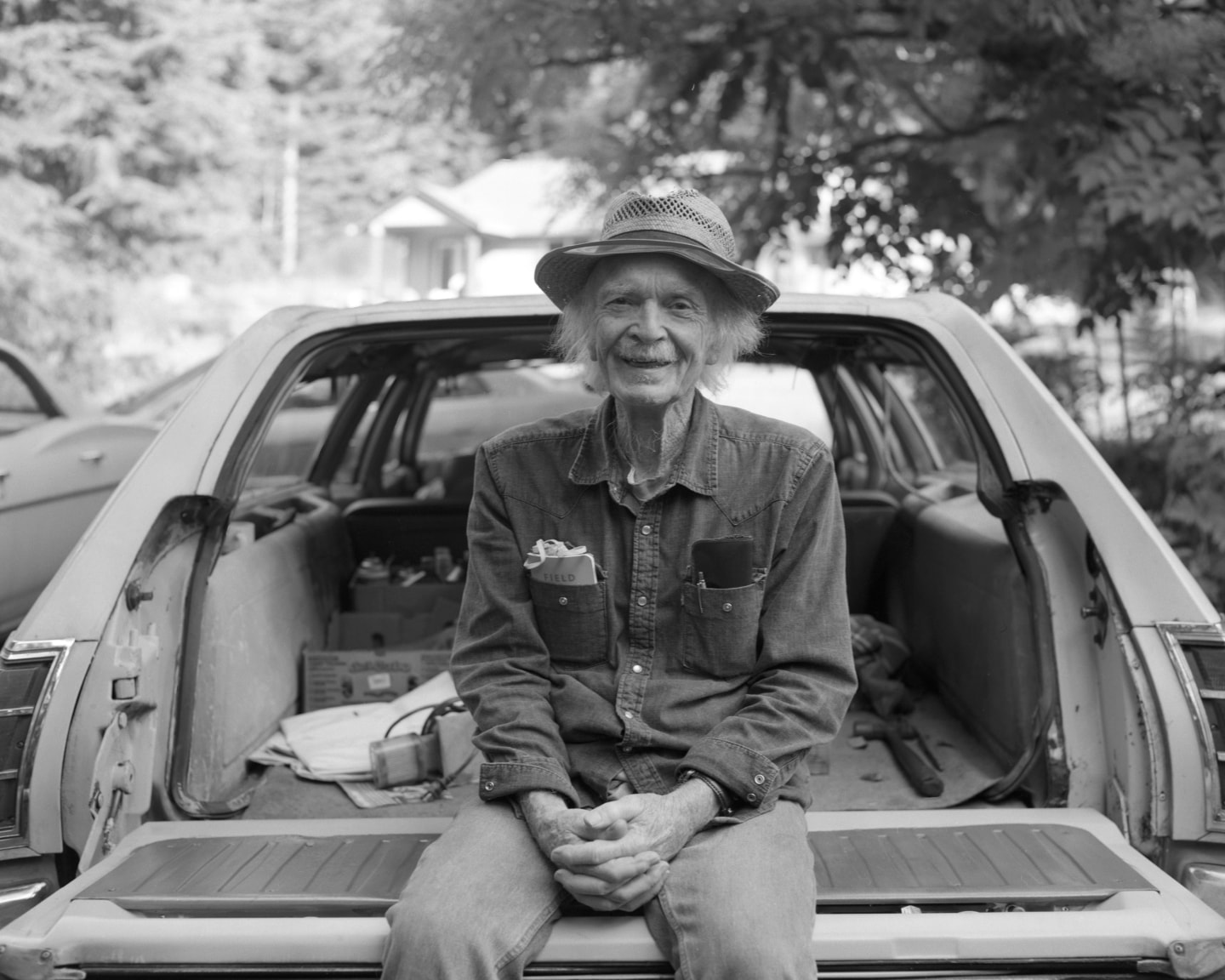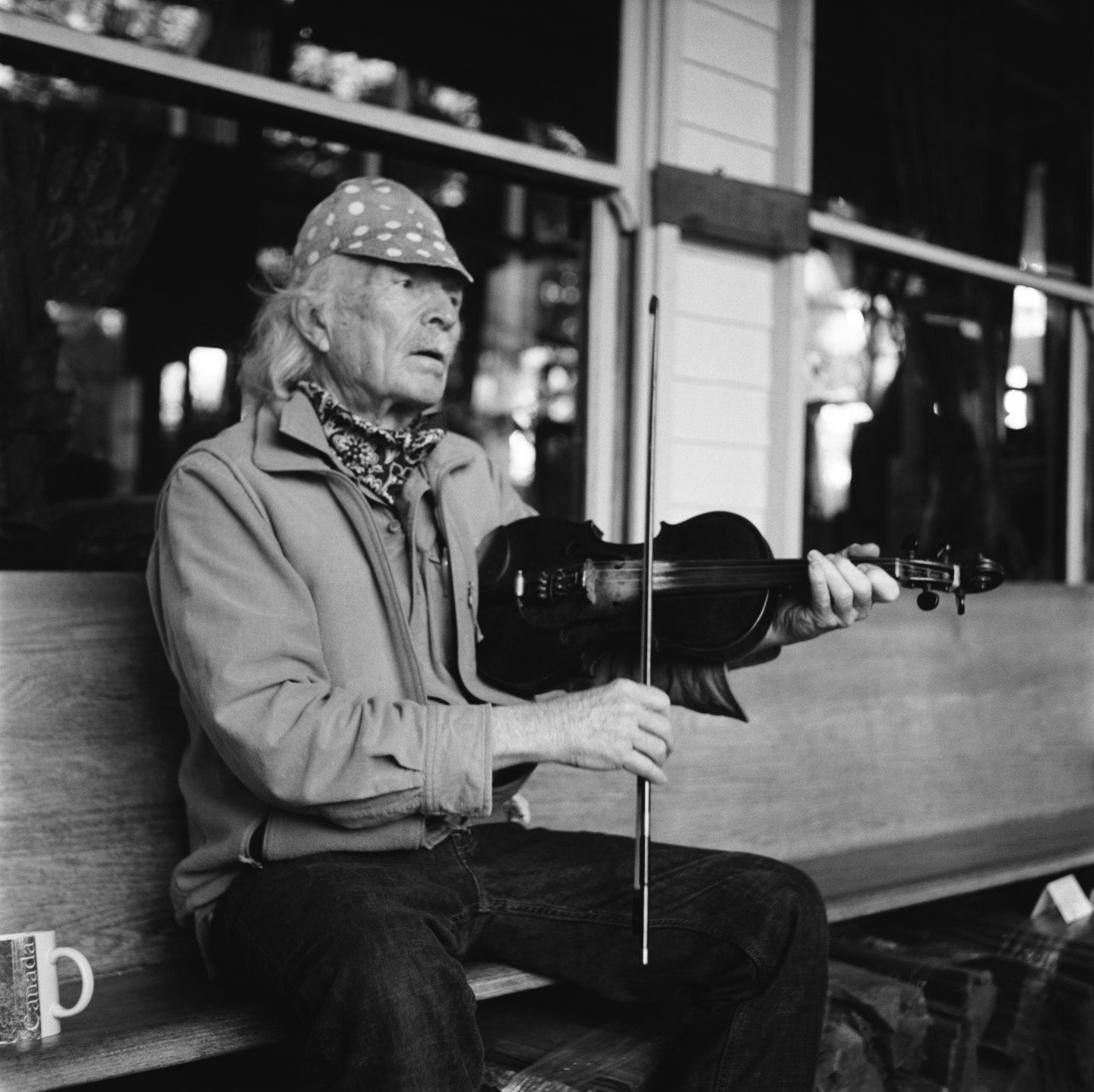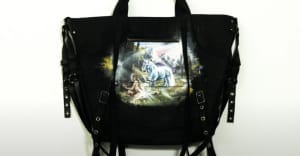Armchair Boogie, a freak-folk masterpiece”>
Michael Hurley. Photo by Sarah Taft.
It’s Saturday, March 29, and an 83-year-old man with a deep-crimson guitar sits in a folding chair on the carpeted floor of a church, just in front of the stage. His movements are labored; someone else had to plug his guitar into an unassuming, knee-high amp. Nevertheless, he plays for an hour, his fingerpicked chords and hoarse tenor voice reverberating against pews packed with the music nerds who’ve gathered in Knoxville, Tennessee for Big Ears Festival. He plays a song about an easy chair somewhere in that state, a song about a hobo talking to a railway track. Mostly, he plays songs about pies.
The man is freak-folk progenitor Michael Hurley. He performed again in Knoxville the following day, for a much smaller crowd packed elbow to elbow into the side room of a Scottish pub. The day after that — his last full day on Earth — he crossed a mountain range to play for a sell-out crowd of roughly 265 in Asheville, North Carolina. The next day, after returning to northwest Oregon, his home base for the past two decades, he died.
 Armchair Boogie, a freak-folk masterpiece”>
Armchair Boogie, a freak-folk masterpiece”>
On the front cover of Hurley’s second album, 1971’s Armchair Boogie, a humanoid, watercolor wolf named Boone sleeps in a deep-crimson velvet armchair. The blue-and-yellow polka-dotted drapes hanging from the wooden slats of his country shack have blown open to reveal rolling hills and a starry sky with a low crescent moon. Boone is one of two jocular, bean-loving wolves who grace the covers of many of Hurley’s albums and are the main characters of a comics series he continued to publish throughout his prolific, 60-year music career. (The other wolf is Jocko, who wears horse blinders “to keep him from seeing the sights and going wild,” Hurley explained in a wild 1997 interview with Popwatch Magazine.)
Like the Jocko and Boone comics, Hurley’s music was steady, though far from static: He’s fluctuated in style through the years, but his home was always a winking but infinitely wise strain of folk-informed blues. The grinning wolf and the sage were with him in all of his songs, revealing themselves as they saw fit.
Armchair Boogie opens with “Werewolf,” a track that first appeared in Hurley’s catalog as “The Werewolf Song” — the closer of his 1964 debut, First Songs — and would go on to pop up on several more of his studio and live records over the next half-century. It’s a fantastical, minor-key murder ballad that begins in the third person before switching to the wolf’s gruesome point of view. “Nobody, nobody, nobody knows / How much I love the maiden as I tear off her clothes,” the wolf sings. He’s not entirely unsympathetic, though. “Nobody, nobody knows of my pain,” he continues, “When I see it has risen, that full moon again.”
Throughout Armchair Boogie, Hurley sings from the perspectives of richly rendered characters: He’s an English nobleman with a nasal, affected caricature of an accent that doesn’t sound anything like what one might imagine an English noblement would. “Oh, oi am an English nobleman / A nobleman am oi,” he sings. “My dignity would be besmirched / If you hit me in the face with a pie.” He’s a hard-luck lover, begging for empathy here (“Be Kind to Me,” a cover of Smiley Lewis’ 1955 New Orleans blues/soul single “Come On,” features backing vocals from Hurley’s older sister Magpie, who introduced him to Fats Domino and, presumably, Smiley Lewis), reminiscing bittersweetly on a relationship with a difficult woman named Sweedeedee there.
Elsewhere, he’s Jocko, singing the blues while claiming he’s never had it. Elsewhere still, he’s a sweetly suicidal stargazer, his sister by his side once again. Later, he’s a hapless romantic, hoping the return of the swallows to Capistrano Beach, California will bring his lover back. Through it all, Hurley is a consummate troubadour, playing guitar and piano next to a wayward cast of characters: his sister Magpie on backing vocals, for example, and his literal partner in crime Robin Remaily (the two robbed trains together for produce they’d then sell to Chinatown markets, Hurley said in the same Popwatch interview) on fiddle and mandolin. His genre leanings change from song to song — Hurley never considered himself a “folk singer,” though he didn’t mind the term “outsider artist,” he told Kreative Kontrol’s Vish Khanna — but their wandering structures create a psychogeographic interstate between his songs. “I am a rubbertramp,” he told Popwatch at age 45, reminiscing on his wheels-up lifestyle, “as Gypsy Moon, Queen of the Hoboes, pointed out a few years ago.”
Then, there’s “Penguins,” Armchair Boogie’s wordless closer and one of the most beautiful tracks ever set to wax — a remarkable achievement considering its lead instrument is Hurley pretending to be a trumpet. Using only his mock trumpet voice, he toots a heartbreaking melody, accompanied by Michael Kane’s real cornet. “He was seated across the room from me, more distant from the mike used, so that the cornet and the mock trumpet’s volume levels were balanced,” said Hurley to Popwatch. The effect is one that resonates across his work: Between the cartoon werewolves, horrid English accents, and pies to the face resonates a profound sadness. “Seems like everybody / Got a little hard luck sometime,” he sings on “Sweedeedee,” elevating to the high end of his register. “And I know one thing for sure, baby / I’ve been having mine.”
After Armchair Boogie, Hurley went on to release close to 30 more albums with original artwork and dozens more cassette-only projects, most of the latter lost to time. In their titles, many of these works contained “Snock,” a nickname he’d earned during his rowdy days and held like a badge of honor for the rest of his life. In 1976, he dropped Have Moicy!, a collaboration with The Unholy Modal Rounders and Jeffrey Frederick & the Clamtones that would go on to become a certified cult classic. (A shoutout is due here to “Slurf Song,” a gorgeous cut about eating and shitting that recently found new life on a 2024 track by LUCY.) In 2021, he shared The Time of the Foxgloves, his first studio album in 12 years and the last one he’d release within his lifetime.
Michael Hurley’s passing marks the loss of one of the most original minds music has ever seen. It’s tragic but also beautiful: He did what he loved up until the very end, an uncompromising vagabond crossing a country he’d come to know better than most anyone after decades of rubbertramping. Unlike most aging artists, he continued to tour past his final release, but it’s hard to believe there aren’t many more Michael Hurley tracks tucked away somewhere, probably in plain sight.
“A recent piece of music I’ve composed was for the fiddle,” he told Popwatch, responding to a question about how his songs come to him. “I was layin’ in bed supposed to have gone to sleep. Thoughts running thru my mind. I was thinking about the people I’d been hanging out with in Ohio, Kentucky. I recalled them saying Danielle played the fiddle, could play “Cluck Old Hen.” I once usetacould play that one. I tried to review the rune in my mind. Was that all there was to it? Wasn’t there a bridge? No, there wasn’t no bridge. Not much of a tune I guess. Should have a bridge. Bridges start runnin’ thru my heart. Hey! I get up. Turn on the light. Fiddle up this bridge. Got it on tape. Would have gone to sleep and forgotten it if it had not been that I had the opportunity to record that night.
“Another one before that; I’m just drooling at the guitar with the moose…disrelated thoughts…I’m not thinking about what my hands are doing. In the succession of my logics: “’ stole the right to live, as if there was no time.’ Lyrically and musically this all flowed right easily. I was performing it the next day.”
 Armchair Boogie, a freak-folk masterpiece”>
Armchair Boogie, a freak-folk masterpiece”>
Michael Hurley. Photo by Patrick Bunch.




